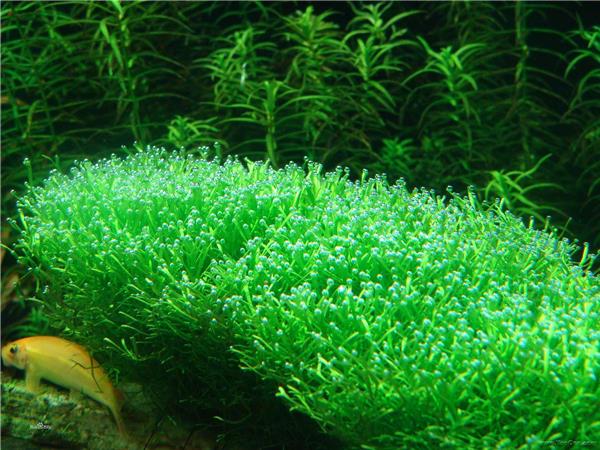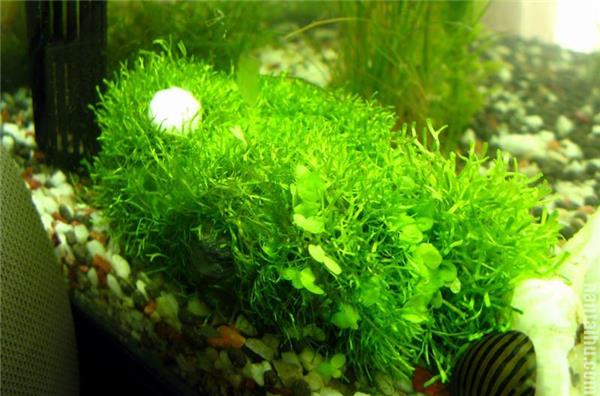Deer antler moss, a magical plant that can create an undersea atmosphere for fish tanks.
The growth height of deer horn moss is relatively low, and the leaves are also relatively small, which will appear more delicate when arranged in the fish tank, which can effectively improve the quality of the fish tank. However, careful care should also be taken when raising antler moss, lest it become the chief culprit for destroying the waterscape.

1. Morphological characteristics of deer horn moss.
Flat, banded, mostly densely growing, light green, 1-6 cm long, 0.5-2 mm wide, multiple forked branches. The cross section is crescent-shaped, and the dorsal epidermis is monolayer; the vegetative tissue is reticulate by most cells, and the cells are large and green. Ventral sparse pseudoroots, without scales. Monoecious. The spermatozoa and archegonia are solitary and encased in the leafy body. The female bracts are spherical and sessile, protruding to the ventral side of the Thallus after maturity, with many pseudoroots outside. Bozi yellowish brown, translucent, about 75-90 microns in diameter, with reticulate protuberances on the outer wall. Antler moss is floating or wet on the surface of the pond.

2. The culture method of deer horn moss
Water quality: the cultivation and cultivation of antler moss need strong light and sufficient carbon dioxide, and antler moss does not like salt soft water. They are more suitable for growing in the water environment where the temperature is 15-30 degrees Celsius and the pH value of water quality is between 6.0 and 8.0. Deer horn moss has no part, so they float like a sponge.
Planting: deer horn moss is propagated in a foliated way, and this aquatic plant is generally used to create the feeling of moss in the forest. When pruning, you should start at an oblique angle and avoid destroying the growing point of the leaf tip. When planting, you need to use a fine net or black thread to fix it on stones of different shapes, or the whole net on a large piece of sunken wood.
Temperature: not less than 22 ℃, it is best to keep it above 25 ℃ in order to grow well.
Lighting: antler moss is not suitable to grow in the dark, it needs a certain scattered light or semi-shady environment, during maintenance, it should be given a certain amount of light.

Third, the landscape collocation of deer antler moss and green algae.
Antler moss is often tied to stones to create endless prosperous grasslands, or it can be tied to stones to create lush grass. Bundling antler moss is usually made of white or dark nylon net (it can also be tied with cotton thread or fishing line, but it is relatively difficult to bind). Take apart the massive antler moss gently, spread it thinly on the sunken wood, and bind it gently with nylon net. The antler moss tied to the sunken wood, like lush grass, is very beautiful.
Green algae, which belongs to higher algae, is "closely related" to Chlorella, showing silky hair and sometimes cotton floss. It is originally the "great enemy" of the aquarium, but if it is well controlled, it can also "turn damage into treasure" and become a beautiful scenery in the aquarium. In fact, the reproduction and maintenance of green algae is not easy, and the water quality must be good. Therefore, it has become an "indicator" for testing the water quality of the aquarium. Green algae tend to grow naturally on sunken wood, so they can be attached to sunken wood without binding.

The most lovely thing about antler moss is that its Y-shaped tufted leaves will produce bubbles that turn into a mermaid's blessing, which is one of the necessary plants for fish tank landscaping.
Related
- Wuhan Hospital Iron Tree Blooming Result Was Instantly Frightened by the Gardener Master
- Which variety of camellia is the most fragrant and best? Which one do you like best?
- What is the small blue coat, the breeding methods and matters needing attention of the succulent plant
- Dormancy time and maintenance management of succulent plants during dormancy
- Minas succulent how to raise, Minas succulent plant pictures
- What are the varieties of winter succulent plants
- How to raise succulent plants in twelve rolls? let's take a look at some experience of breeding twelve rolls.
- Attention should be paid to water control for succulent plants during dormant period (winter and summer)
- Watering experience of twelve rolls of succulent plants
- Techniques for fertilizing succulent plants. An article will let you know how to fertilize succulent plants.



